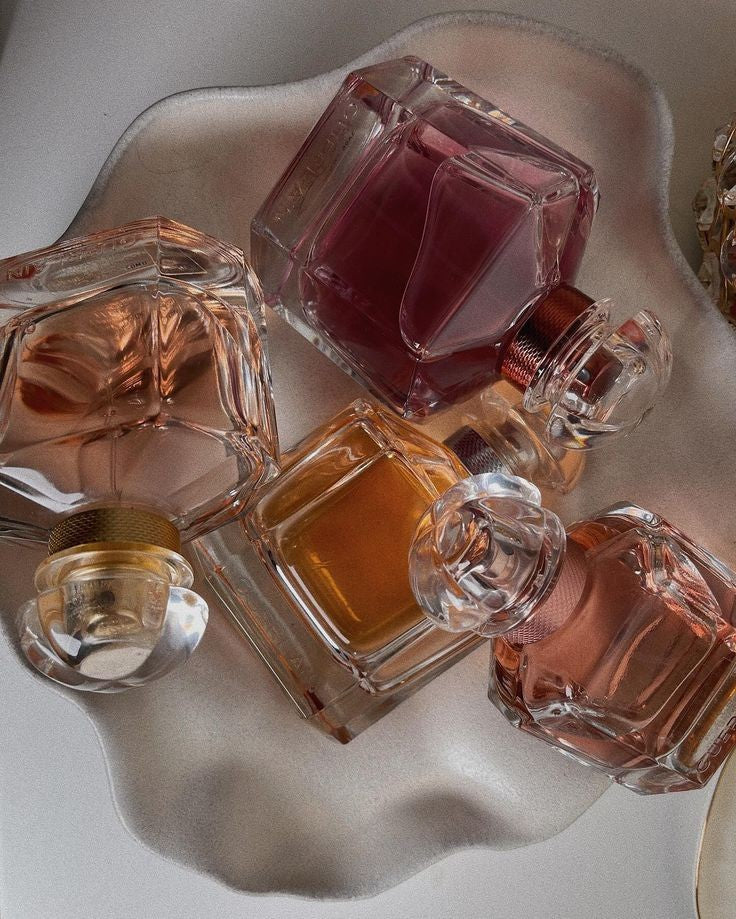
How Long Should You Keep Your Perfume? A Guide to Longevity and Care
Share
How Long Should You Keep Your Perfume? A Practical Guide to Longevity and Care
Perfume is more than just a beauty product—it's an essential part of self-expression for many people, leaving a unique scent trail wherever they go. However, like all cosmetic items, fragrances have a limited shelf life. So, how long can you keep a perfume before it starts to lose its charm? In this article, we'll explore how to preserve your favorite scents, how to spot when a perfume has expired, and practical tips to help extend its lifespan.
Factors That Affect Perfume’s Lifespan
1. Fragrance Composition
The composition of the fragrance plays a significant role in its longevity. Eau de Toilette, which typically contains less than 10% perfume concentrate, has a shorter shelf life compared to Eau de Parfum or perfume extracts. The latter, with a higher concentration of 15% to 20%, tends to last much longer, often for several years.
2. Storage Conditions
Where you store your perfume can make all the difference in how long it lasts. The ideal environment for your fragrance is cool, dry, and away from direct sunlight. Exposure to heat, light, and humidity accelerates the breakdown of fragrance compounds, leading to premature spoilage.
For optimal storage:
- Avoid the bathroom, where temperature and humidity fluctuate frequently.
- Store perfumes in dark drawers, closed cabinets, or a cool closet in your bedroom.
- If possible, keep the perfume in its original box to offer extra protection from light.
3. Type of Bottle
The material and design of the perfume bottle also impact its shelf life. Opaque or dark-colored bottles offer better protection from UV rays than clear bottles. Some bottles even have hermetic seals to prevent air from entering, reducing the risk of oxidation.
How to Spot Expired Perfume
1. Color Change
One of the first signs of perfume going bad is a noticeable color change. If your fragrance, once light in color, starts to take on a yellow or brownish hue, it’s an indication that chemical reactions are occurring, signaling the perfume is no longer fresh.
2. Altered Odor
Your nose is your best tool for determining if a perfume has expired. If the scent develops an acidic, metallic, or off-putting note, it's likely that the fragrance has oxidized and lost its original freshness.
3. Thickened Consistency
If your perfume feels thicker or more viscous than usual, this could be due to the breakdown of certain components over time, which can cause the liquid to become unstable.
Tips to Extend the Life of Your Perfume
1. Use Wisely
To preserve your fragrance, use it sparingly and avoid exposing it to air and light too often. Try saving your favorite bottles for special occasions, rather than making them part of your daily routine.
2. Maintain the Right Temperature
Like fine wine, perfume benefits from a stable temperature. Store it in a temperate cellar or a cool, dark place, away from extreme temperature changes.
3. Choose Smaller Bottles
If you don't use perfume every day, consider opting for smaller bottles. This way, you can enjoy your fragrance while it's still fresh, without worrying about it going unused for long periods.
4. Regular Checks
Every month, do a quick sensory test. Spray a little perfume on blotting paper and check for any signs of expiration—such as changes in scent or texture—so you can catch problems early.
How Long Does a Perfume Last? A Breakdown by Type
-
Eau de Toilette: These fragrances typically last between 2 to 3 years when stored properly. Because they contain a lower concentration of perfume oils, their longevity is shorter compared to stronger types.
-
Eau de Parfum: With a higher concentration of oils, Eau de Parfums generally last 4 to 5 years when stored under ideal conditions.
-
Perfume Extract: This is the purest and most concentrated form of fragrance, offering the longest shelf life. Perfume extracts can last up to 10 years or more when kept in the right environment.
Ingredients and Their Impact on Shelf Life
-
Natural vs. Synthetic Oils: Perfumes made with primarily natural essential oils tend to have a shorter shelf life due to the volatility of these oils. On the other hand, synthetic oils are more stable and help extend the longevity of fragrances.
-
Fixatives: Certain ingredients, like synthetic musk or ambergris, act as "fixatives" in perfumes, stabilizing the fragrance and preventing it from breaking down quickly. These can significantly prolong a perfume’s shelf life.
Health Risks of Using Expired Perfume
-
Allergic Reactions: Using expired perfume can cause skin irritation, redness, or itching—especially if you have sensitive skin.
-
Respiratory Issues: The breakdown of chemical compounds in expired perfumes can lead to respiratory discomfort, particularly for those with asthma or other lung conditions.
-
Hormonal Disruptions: Some older perfumes contain endocrine-disrupting chemicals that may interfere with your hormonal balance, potentially causing long-term health effects.
Conclusion
Your perfume is more than just a scent; it's a part of your personal identity. To enjoy it at its best, proper storage and regular checks are key to preserving its quality. By understanding the factors that influence a fragrance’s lifespan and following a few simple guidelines, you can ensure that your favorite scents last as long as possible—so you can enjoy them to the fullest!